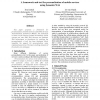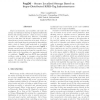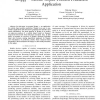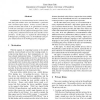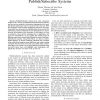MDM
2007
Springer
15 years 8 months ago
2007
Springer
Location technology allows for the tracking and tracing of individuals. Users may increasingly be concerned about the abilities of new technology to keep an eye on ones’ private...
113
click to vote
MDM
2007
Springer
15 years 8 months ago
2007
Springer
This paper proposes a framework for personalisation of mobile services called Web Services Personalisation Framework (WSPF). The framework is based on the Service-Oriented Archite...
124
click to vote
MDM
2007
Springer
15 years 8 months ago
2007
Springer
Smart environments and wearables will make the storage and subsequent sharing of digitized multimedia diaries and meeting protocols – whom we meet, or what we say or do – chea...
101
click to vote
MDM
2007
Springer
15 years 8 months ago
2007
Springer
—In this paper we present Moppy — an application for mobile object position prediction. Moppy is an easy to use, intuitive application with interactive graphical user interface...
120
click to vote
MDM
2007
Springer
15 years 8 months ago
2007
Springer
FriendFinder as a location-based service collects location data from mobile users and distributes a particular user’s location upon request. Privacy of users data especially loc...
109
click to vote
MDM
2007
Springer
15 years 8 months ago
2007
Springer
In this paper, we analyze security and privacy issues in RFID-based reference point systems, which seamlessly provide high resolution location information so as to enable innovati...
105
click to vote
MDM
2007
Springer
15 years 8 months ago
2007
Springer
—Publish/Subscribe systems have been extensively studied in the context of distributed information-based systems, and have proven scalable in information-dissemination for many d...
139
click to vote
MDM
2007
Springer
15 years 8 months ago
2007
Springer
— In mobile ad-hoc peer-to-peer (M-P2P) networks, economic models become a necessity for enticing non-cooperative mobile peers to provide service. M-P2P users may issue queries w...
105
click to vote
MDM
2007
Springer
15 years 8 months ago
2007
Springer
Personalization systems exploit preferences for providing users with only relevant data from the huge volume of information that is currently available. We consider preferences th...


